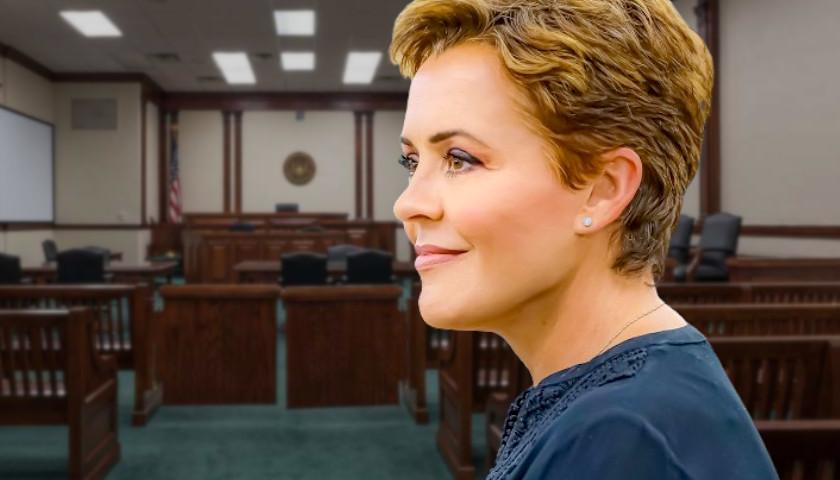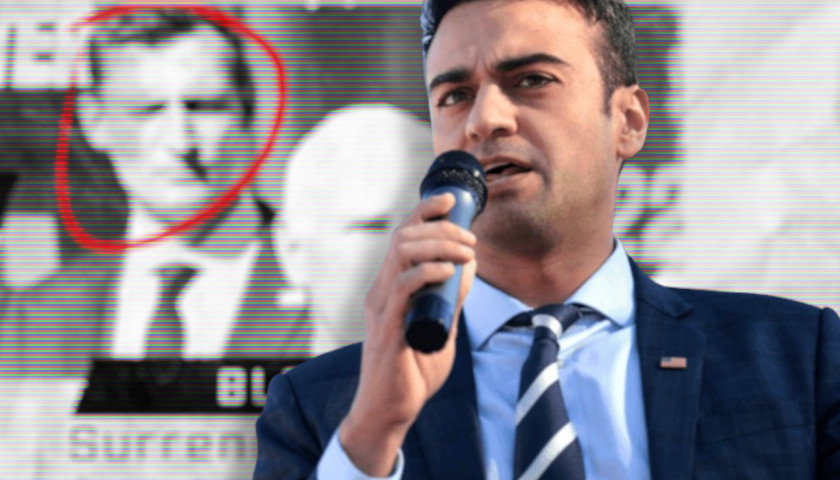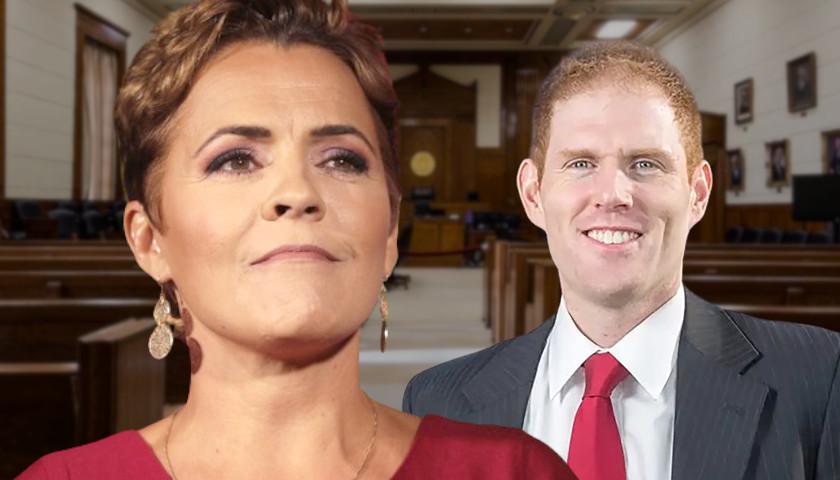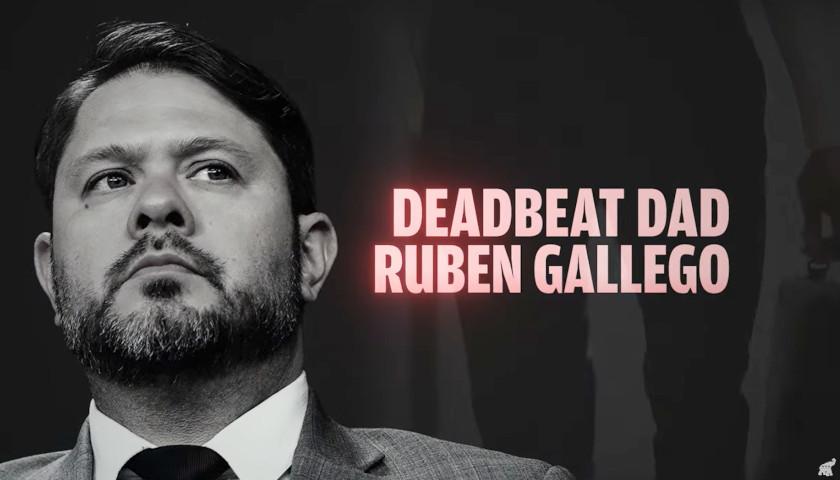The State Bar of Arizona announced that it found probable cause to pursue disciplinary charges against three attorneys representing Kari Lake in her election-related cases. The attorneys are Bryan Blehm, Kurt Olsen, and Andrew Parker. The charges relate to election lawsuits the three filed for Lake. The Arizona Bar has increasingly come under criticism for targeting conservative attorneys.
Blehm, who is accused by the Arizona Bar of criticizing the Arizona Supreme Court for setting up a disinformation task force, told The Arizona Sun Times, “If the ethical rules can be interpreted such that lawyers must remain silent in the face of unconstitutional conduct by the very courts they serve then I question the validity of those ethical rules and/or the veracity of those interpreting them. We are duty bound as attorneys to defend the Constitution of the United States of America and that is the proper function of the courts. When the courts themselves violate the Constitution somebody must say something because there is nowhere left for the people to turn. When our courts fail us, we are no longer a constitutional republic.”
Retired Arizona attorney Scott Stirling, a progressive who comments on election litigation and frequently criticizes local conservatives on X, said he didn’t think the attorneys deserved much punishment.
“I’ve seen a lot from Blehm & maybe some from Olsen that would warrant a censure, but not clear what is being alleged as the basis for discipline that would result in anything more substantial like suspension, much less disbarment,” he posted.
The Attorney Discipline Probable Cause Committee entered an order of Probable Cause in the three cases, which means the Arizona Bar will follow up with formal complaints. The letters to the attorneys informing them of the findings offered them an opportunity to agree to discipline by consent.
“Before a formal complaint is filed and discipline commenced, this matter may be resolved by an agreement for discipline by consent,” the letters said. “Rule 57, Ariz. R. Sup. Ct., allows a Respondent to tender conditional admissions to a charge in exchange for a stated form of discipline. An agreement for discipline by consent saves time and costs and provides an opportunity for you to participate in developing a formal statement of the case for the record.”
The Arizona Bar has not announced yet what discipline it is pursuing. There is an incentive for attorneys to consent to discipline since there is a risk the bar will pursue a harsher punishment against them, or that its disciplinary judge will issue a harsher punishment. Disciplinary judges have occasionally meted out tougher sentences than the Arizona Bar was asking for.
The Arizona Bar pointed out the sanctions against Blehm and Olsen that the Arizona Supreme Court issued in May 2023 over their assertion in briefs for Lake that 35,563 ballots were injected into the 2022 election at Maricopa County’s third-party vendor Runbeck Election Services. The court objected to this claim by the attorneys, declaring, “The representation that this was an ‘undisputed fact’ is … unequivocally false.”
Runbeck could not show proof of chain of custody as required by law for the ballots, a class 2 misdemeanor. No one has ever shown that the ballots were properly brought to Runbeck, and the company has successfully fought in court against turning over video surveillance of its loading dock. Maricopa County Superior Court Judge Bradley Astrowsky sided with Runbeck after We the People AZ Alliance sued Runbeck for the video. A retired attorney filed a judicial complaint against Astrowsky alleging a conflict of interest for ruling on election cases when he was on the ballot himself for retention.
The Arizona Supreme Court’s sanctions against the attorneys were only $2,000. Lake’s attorneys’ opponents have asked for sanctions against them at other times, which have almost always been rejected.
All three attorneys responded to the Arizona Bar’s claim that they violated several ethics rules. The Arizona Bar accused them of several rules that are often used to disbar conservative attorneys. They include not criticizing judges, not engaging in conduct involving “deceit or misrepresentation” or that is “prejudicial to the administration of justice,” and maintaining “respect” toward the courts. The rule against criticizing judges has been a subject of controversy among many First Amendment experts, who believe it is an encroachment on free speech.
Blehm and Olsen explained in their responses to the Arizona Bar that none of the defendants in the case, including then-Secretary of State Katie Hobbs, ever disputed Lake’s contention in her briefs that 35,563 ballots were inserted into the election process at Runbeck, which is why they referred to it as an “undisputed fact.” The attorneys showed how Hobbs’ exhibits revealed the discrepancy. Runbeck’s Receipts of Delivery showed that 263,379 ballots were received, but Runbeck’s Scan Receipts showed 298,942 ballots were scanned during the same time period.
The Arizona Bar accused Parker of making a false claim: “Your argument that Arizona uses ‘electronic voting machines,’ when only a small portion of the population can cast a vote using a computer and paper ballots are generated.”
Similarly, they said Parker falsely claimed that Arizona doesn’t use paper ballots, which his attorneys explained in his response was a distortion of what his briefs alleged. Parker was referring to the practice of electronic machines counting ballot images instead of hand-counting ballots. He was also accused of two more false statements: “Your argument that Arizona voting systems are connected to the internet…” and claiming that voting anomalies in Georgia also occurred in Arizona.
Last month, the Arizona Bar sent out a survey to its members asking whether its disciplinary process shows bias against attorneys based on their political views. It has come under criticism in recent years for its draconian punishments of conservative attorneys, especially the disbarment of former Maricopa County Attorney Andrew Thomas in 2012. After that, bills were run almost every year in the Arizona Legislature to rein in the disciplinary power of the Arizona Bar. Several conservative election attorneys in Arizona are under investigation by the Arizona Bar or have recently been disciplined.
State bars nationwide are aggressively pursuing conservative election attorneys involved in litigating election illegalities. The State Bar of California went after Donald Trump’s former attorney and constitutional scholar, John Eastman, seeking to disbar him for his work representing Trump in the 2020 election challenges. He is awaiting the California disciplinary judge’s decision, who is expected to disbar him. The District of Columbia Bar is seeking to disbar Trump’s DOJ appointee Jeffrey Clark for his role in the 2020 election challenges, drafting a memo to Georgia election officials advising them of their options, which was never sent.
After the Arizona Bar brings formal charges against the three attorneys, there will be trials before the Arizona Bar’s presiding disciplinary judge, a volunteer attorney and a volunteer non-attorney member of the public. That process came under fire when it was discovered that one of the volunteers was a neighbor of the disciplinary judge.
The orders make the Arizona Bar’s investigative orders private. The filings are located here.
– – –
Rachel Alexander is a reporter at The Arizona Sun Times and The Star News Network. Follow Rachel on Twitter / X. Email tips to [email protected].
Photo “Kari Lake” by The Kari Lake.








